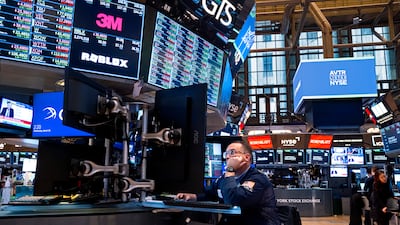US stocks sank on Friday on worries about rising geopolitical tensions, persistent inflation and a mixed start to the earnings reporting season.
This pushed investors to look for safer places for their money such as gold, bonds and the dollar.
The greenback notched its best week since September 2022. Brent oil settled above $90 and gold topped the $2,400-an-ounce mark before losing gains.
The S&P 500 sank 1.5 per cent, its biggest weekly drop in 2024, with banks and chip makers leading the way down.
The Dow Jones Industrial Average fell 1.2 per cent, and the Nasdaq Composite lost 1.6 per cent.
Equities suffered their worst day since January after a news report that Israel was bracing for an attack by Iran on government buildings.
Approximately 40 launches were identified crossing from Lebanese territory, some of which were intercepted, the Israel Defence Forces wrote in a post on X.
US President Joe Biden said on Friday he expected Iran to attack Israel “sooner, rather than later” and warned Tehran not to proceed.
Wall Street’s “fear gauge” – the VIX – spiked to levels last seen in October.
“Risk was off the menu on Friday on a news report that Israel was in for a direct attack by Iran on government targets. This could happen as soon as Saturday, according to Bloomberg,” said Fawad Razaqzada, market analyst at City Index and Forex.com.
Investors were lighting up on risk exposure ahead of the weekend, fearing risk assets could gap lower should something happen at the weekend, he said.
“Besides raised geopolitical risks and higher oil prices, the US dollar has also found support after strong inflation data and surprising resilience in data pushed back expectations of the Fed’s rate cuts,” Mr Razaqzada added.
At 3.5 per cent, consumer prices in March rose to their highest annual pace since October.
That was the fourth consecutive month when consumer price inflation overshot market expectations, as prices of many basic necessities rose sharply.
Officials said on Friday that there is no urgency to lower interest rates, pointing to still-elevated inflation and a robust labour market.
Federal Reserve Bank of Boston president Susan Collins hinted at a couple of interest rate cuts this year given expectations it could still take some time to get inflation back to targeted levels.
Traders are largely betting on just cuts, according to data from CME Group, down from forecasts for at least six at the start of the year.
Meanwhile, the first quarter earnings season kicked off with reports from banks such as JP Morgan, Citigroup and Wells Fargo.
JP Morgan sank 6.5 per cent despite reporting stronger profit for the first three months of the year than analysts expected.
This week will feature reports from the Bank of America, Johnson & Johnson and UnitedHealth Group.
The yield on benchmark US 10-year notes fell 5.9 basis points to 4.518 per cent from 4.576 per cent late on Thursday.
The price of gold rose, which is typical when investors are herding into investments seen as safer.
Bullion, which has been setting records, got close to touching $2,450 per ounce for the first time before paring its gain.


